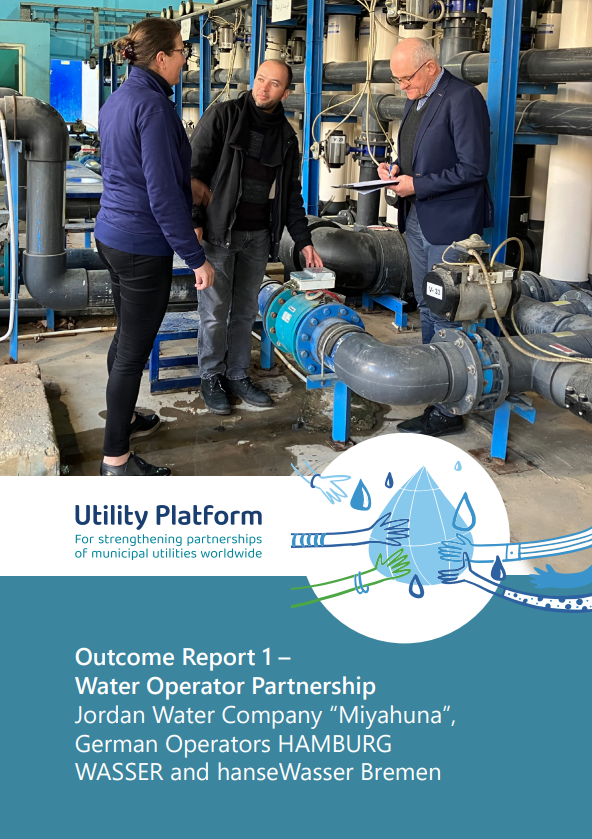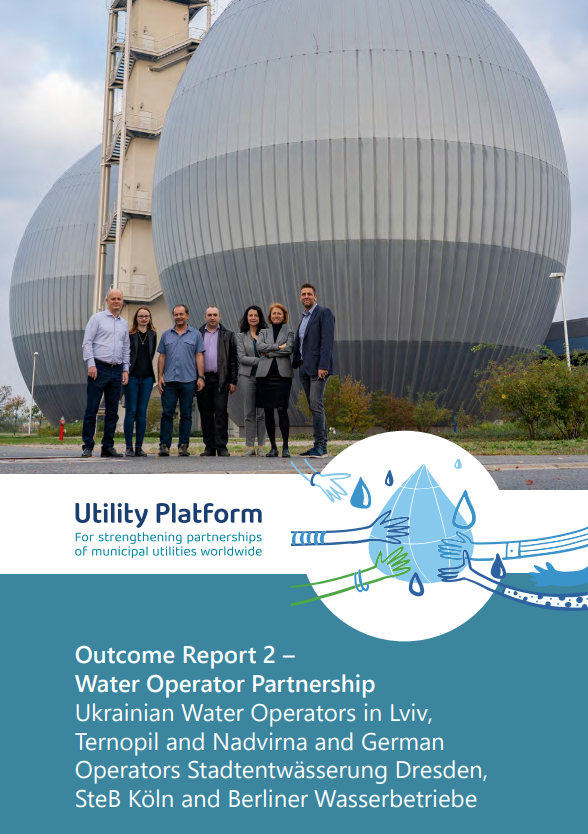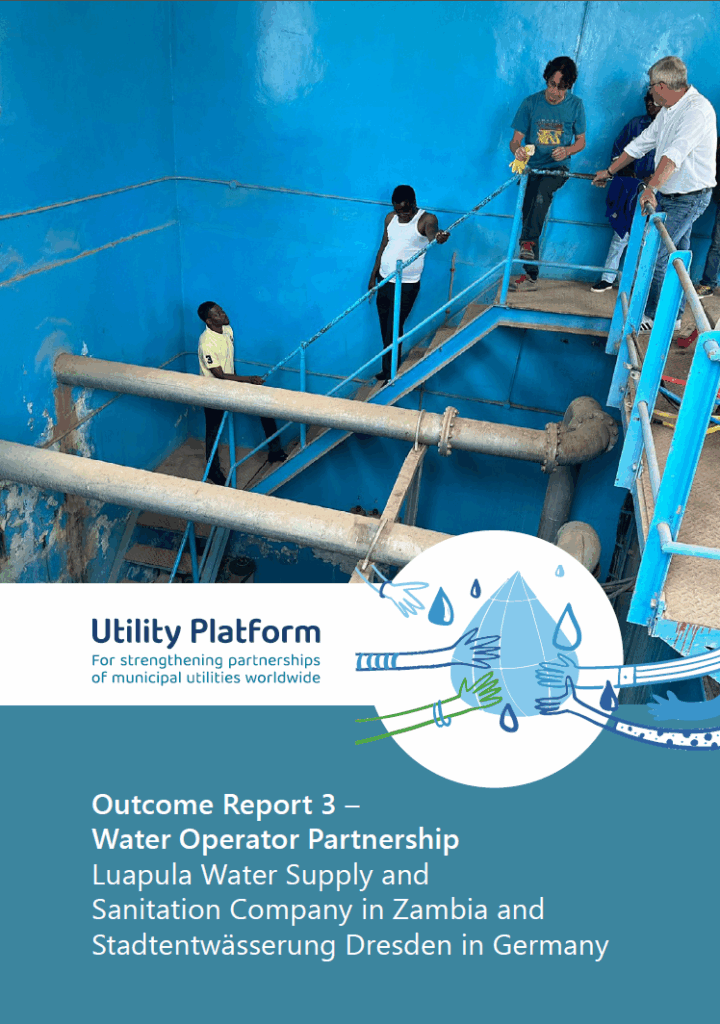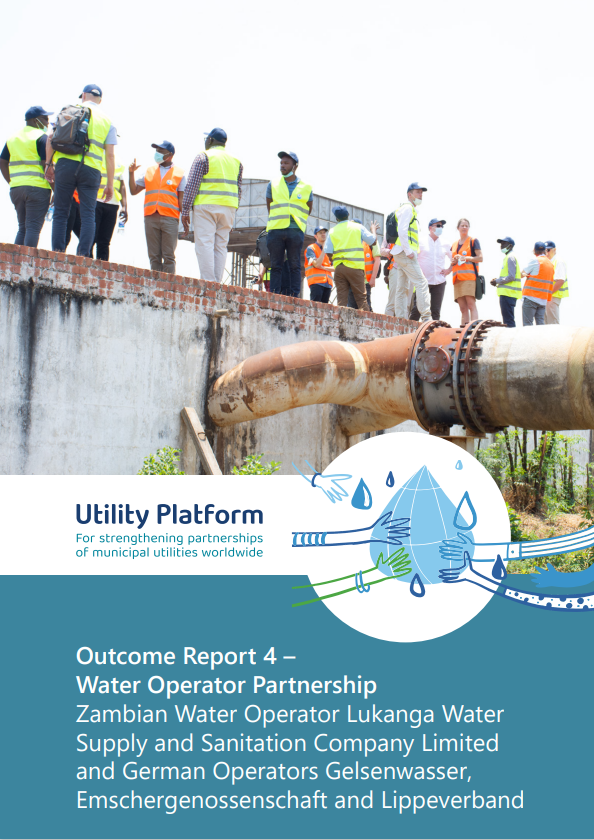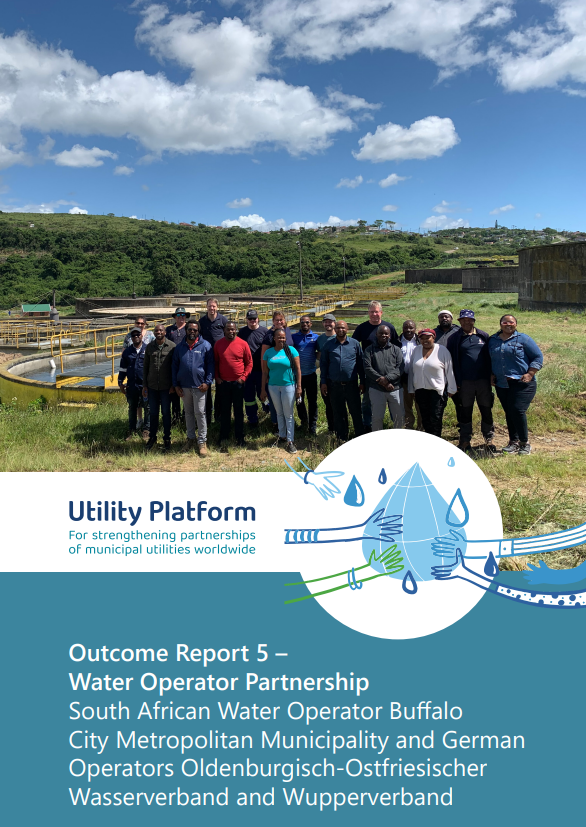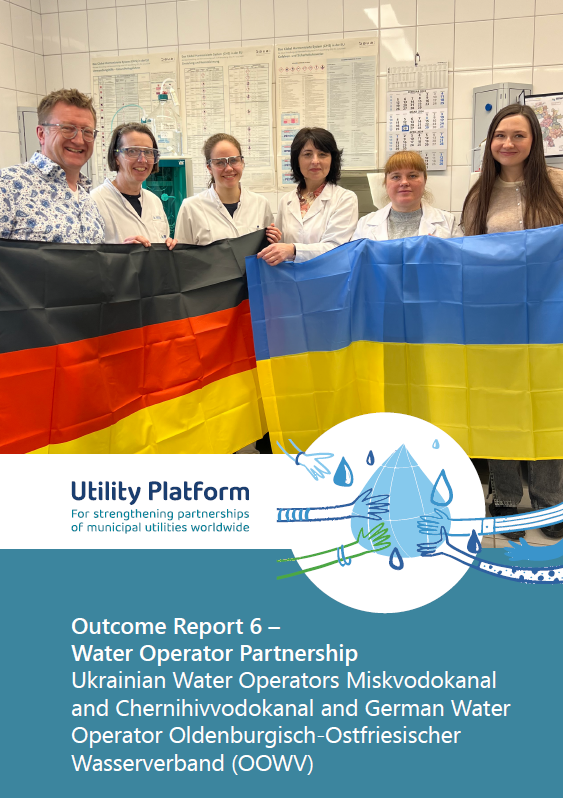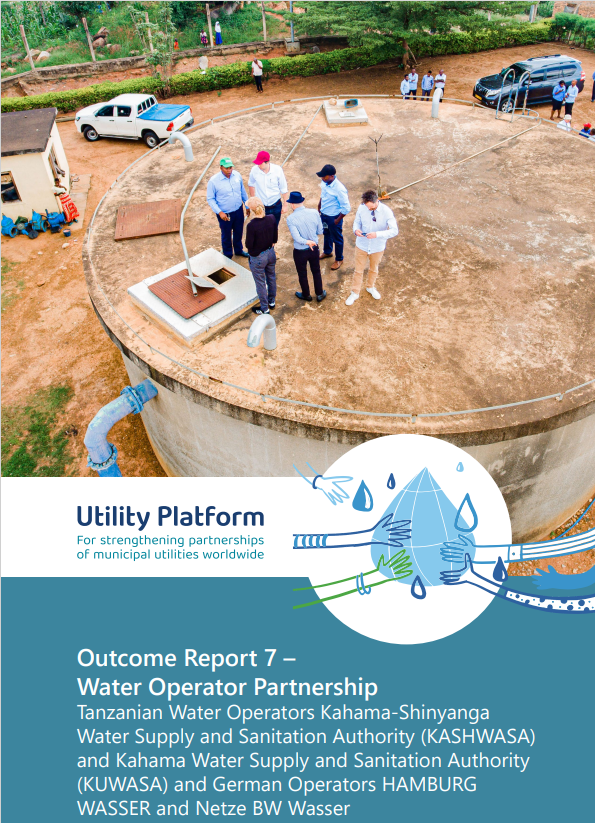The reports describe key project characteristics, progress made under the GIZ pilot phase, outcomes in each of the working packages and the evolution of the partnership strength.
The outcome reports are based on the monitoring system of the Utility Platform. More information can be found here: Workshop summary: How to Achieve Effective Monitoring of Operator Partnerships
1. Outcome Report: Hamburg Wasser and Miyahuna (Jordan)
The utility partnership between HAMBURG WASSER, hanseWasser Bremen und Miyahuna from Jordan has existed since 2021 and achieved impressive results: While working on the optimization of drinking water production during the partnership, the dosing points for chemicals (coagulation metering room, polymer inlet flocculation), and filtration were improved. Among other technical impacts, this also resulted in monthly average cost savings of around 30,000 EUR. The main focus areas of the partnership are optimization of drinking water production, water quality and KPI system, wastewater and sludge management.
2. Outcome Report: Stadtentwässerung Dresden, SteB Köln, Berliner Wasserbetriebe and Lviv, Ternopil and Nadvirna (Ukraine)
The utility partnership started in July 2019, initially with three German partners and Lvivvodokanal as well as the Ukrainian water and wastewater association ‘Ukrovodokanalecologiya’ on the Ukrainian side. Nadvirnavodokanal and Ternopilvodokanal were included at the end of 2021. In the meantime, almost all planned results have been achieved, despite difficult circumstances (COVID-19, outbreak of war in Ukraine) and a large number of partners. Over the past two years, the Ukrainian companies have received vehicles, cables, pumps, motors, transformers, frequency converters, hose connections, emergency power generators, satellite phones, radios and much more. Some training courses were also organised. In addition, some topics have the potential to trigger broader discussions within the Ukrainian water sector, e.g. the issue of tariff calculation.
3. Outcome Report: Stadtentwässerung Dresden GmbH and Luapula Water Supply and Sanitation Company (Zambia)
The utility partnership between Stadtentwässerung Dresden GmbH (SEDD), Zweckverband Wasser und Abwasser Vogtland (ZWAV), Fernwasserversorgung Elbaue-Ostharz GmbH (FEO) and Luapula Water Supply and Sanitation Company Limited (LpWSC) started in May 2022 and was funded until July 2023 as part of the pilot phase of the German Utility Platform. The aim of the support was to consolidate the partnership and create a basis for thematic cooperation. GIZ’s bridging function enabled the partners to carry out a fact-finding mission to LpWSC in Zambia. The project was then transferred to the European Union’s WOP programme ‘Global Water Operators’ Partnerships Alliance (GWOPA)’. During the pilot phase, the operators worked on work packages water production, water distribution, and sanitation.
4. Outcome Report: Gelsenwasser, Emschergenossenschaft and Lippeverband und Lukanga Water Supply and Sanitation Company (Zambia)
The utility partnership was launched in January 2021 under the pilot phase of the German Utility Platform. The report outlines the key characteristics of the project, the progress achieved during the pilot phase, the results delivered across the core working packages, and the overall development of the partnership. The focus areas included Water Supply, Wastewater and Asset Management, Energy Management and Preventive Maintenance, and Public Relations. During the pilot phase, the partnership delivered considerable outcomes. A total of 69 operational staff at LgWSC were trained, strengthening their technical capacity in preventive maintenance, general plant maintenance, and maintenance of electrical systems. In addition, a web-based QGIS application was developed, making GIS data easily accessible to all staff using smartphones. To reduce physical water losses, a pilot District Meter Area (DMA) was established, resulting in a substantial reduction of Non-Revenue Water (NRW) from 41% to 19% in the targeted area.
5. Outcome Report: Oldenburgisch-Ostfriesischer Wasserverband, Wupperverband and Buffalo City Metropolitan Municipality (South Africa)
The utility partnership between the Oldenburgisch-Ostfriesischen Wasserverband (OOWV), the Wupperverband (WV), and the South African Buffalo City Metropolitan Municipality (BCMM) was launched in February 2022. This report outlines the progress made by the three operators during the pilot phase of the Utility Platform across four key work packages: water supply, wastewater management, environmental education, and digitalisation. In the area of capacity development, a significant increase in knowledge, technical competencies, and insights among staff across all three organisations has been particularly noteworthy. As the report covers only the first 20 months of the partnership, many processes are still ongoing. However, once the new systems are fully implemented, several impactful outcomes are expected at BCMM. For instance, the automated wastewater logbook will in future provide real-time data, enabling rapid adjustments and optimisation of the wastewater treatment processes.
6. Outcome Report: Oldenburgisch-Ostfriesischer Wasserverband, Chernihivvodokanal and Miskvodokanal (Ukraine)
The utility partnership between the Oldenburgisch-Ostfriesischer Wasserverband (OOWV) and the Ukrainian operators Miskvodokanal in Sumy and Chernihivvodokanal began in mid-2022 as a temporary (six-month) solidarity measure to provide emergency supplies to repair war-related damage. Since then, the partnership has been extended until June 2024 to carry out a second round of emergency supplies. In addition, a thematic exchange between the partners has been initiated. The report describes the main features of the project, the progress made during the pilot phase, the results of the key work packages and the overall development of the partnership. The main areas of focus included emergency supplies for Chernihiv, emergency supplies for Sumy and technical advice on rehabilitation plans for water and wastewater facilities.
7. Outcome Report: HAMBURG WASSER, Netze BW Wasser, KASHWASA und KUWASA (Tanzania)
The utility partnership between HAMBURG WASSER, Netze BW Wasser, and the Tanzanian utilities KASHWASA and KUWASA has been in place since February 2022 and was initiated as part of the pilot phase of the Utility Platform. Together, the four partners successfully worked on four work packages: improving network performance including the reduction of Non-Revenue Water (NRW), water production, Geographic Information Systems (GIS), and management support. The partnership achieved notable results: In the area of water production at KASHWASA, optimised disinfection in particular through the adjusted and reduced dosing of chlorine led to annual cost savings of up to EUR 330,000. In the NRW work package, staff from both Tanzanian utilities gained extensive knowledge on pressure management within the water network, the application of the IWA water balance for calculating NRW, and the installation and use of ultrasonic flow meters. In the GIS work package, Tanzanian professionals significantly improved the quality and completeness of their geodata by applying newly acquired methods and using newly provided equipment. At KUWASA, this progress was evident in the improved mapping of the water supply network and more accurate customer location data.
Covers
